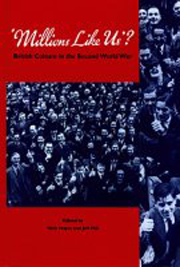Book contents
- Frontmatter
- Contents
- List of Figures and Tables
- Notes on Contributors
- Acknowledgements
- An ‘English War’, Wartime Culture and ‘Millions Like Us’
- British Cinema and ‘The People's War’
- The People's Radio: The BBC and its Audience, 1939–1945
- Was it the Mirror Wot Won it? The Development of the Tabloid Press During the Second World War
- A More Even Playing Field? Sport During and After the War
- A Time for Hard Writers: The Impact of War on Women Writers
- Safe and Sound: New Music in Wartime Britain
- More Than ‘Music-While-You-Eat’? Factory and Hostel Concerts, ‘Good Culture’ and the Workers
- ‘When Work Is Over’: Labour, Leisure and Culture in Wartime Britain
- Not Just a Case of Baths, Canteens and Rehabilitation Centres: The Second World War and the Recreational Provision of the Miners' Welfare Commission in Coalmining Communities
- ‘You and I – All of Us Ordinary People’: Renegotiating ‘Britishness’ in Wartime
- Postscript: A War Imagined
- Index
‘You and I – All of Us Ordinary People’: Renegotiating ‘Britishness’ in Wartime
- Frontmatter
- Contents
- List of Figures and Tables
- Notes on Contributors
- Acknowledgements
- An ‘English War’, Wartime Culture and ‘Millions Like Us’
- British Cinema and ‘The People's War’
- The People's Radio: The BBC and its Audience, 1939–1945
- Was it the Mirror Wot Won it? The Development of the Tabloid Press During the Second World War
- A More Even Playing Field? Sport During and After the War
- A Time for Hard Writers: The Impact of War on Women Writers
- Safe and Sound: New Music in Wartime Britain
- More Than ‘Music-While-You-Eat’? Factory and Hostel Concerts, ‘Good Culture’ and the Workers
- ‘When Work Is Over’: Labour, Leisure and Culture in Wartime Britain
- Not Just a Case of Baths, Canteens and Rehabilitation Centres: The Second World War and the Recreational Provision of the Miners' Welfare Commission in Coalmining Communities
- ‘You and I – All of Us Ordinary People’: Renegotiating ‘Britishness’ in Wartime
- Postscript: A War Imagined
- Index
Summary
Caroll Levis's film Discoveries, made in the summer of 1939 as a spin-off from his radio talent-show of the same name, while not destined to enter the canon of memorable British cinema, did contain one moment of cultural resonance. With war looming, the film rose to the occasion in a grand finale featuring Master Glyn Davies, the Welsh boy soprano, in midshipman's uniform, surrounded by a huge chorus of bell-bottomed sailors, and warbling a new song by Ross Parker and Hughie Charles called There'll Always Be An England.
The film was soon forgotten, but the song lived on: when war came it went straight to the top of the best-sellers list, and within two months 200,000 copies of the sheet music had been sold. It was the first great hit song of the war. More than this, along with Parker and Charles's other big hit We'll Meet Again, it is one of the handful of wartime songs still remembered 50 years after the event. But while the longevity of We'll Meet Again owes a great deal to that of Dame Vera Lynn, There'll Always Be An England has lived on in a different cultural category: it is a national song – despite its Tin Pan Alley provenance, up there with Land of Hope and Glory and Rule Britannia, and deemed suitable to be taught to primary school children at the time of the Coronation in 1953, which is where the present author first encountered it.
- Type
- Chapter
- Information
- Millions Like Us?British Culture in the Second World War, pp. 295 - 322Publisher: Liverpool University PressPrint publication year: 1999



